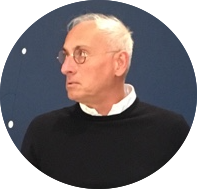
A review of Strange Is Normal The Amazing Life of Colin Wilson.
This feature-length documentary interview is nothing less than a super-up-close-and-personal visit with the legendary author and philosopher, Colin Wilson. Superbly conducted by the scholar Dennis Price we are given what seems total access to the Wilson domain, and total access to the phenomenal range of Wilson’s intellectual activities.
Colin Wilson is the author of over one-hundred-and-fifty books on what seems to be just as many topics — topics as various as the bicameral mind, psychological studies of authors such as August Strindberg, science-fiction novels, studies of the criminal mind, and then of course his brilliant analyses of poetry and of world literature and of the human condition — and Mr. Price is in his element as he leads us on a tour of all of these. (As any one of these topics can produce, if it does not indeed warrant, a feature-length documentary interview in itself, Mr. Price’s task is to present as comprehensive a survey as possible, and this he does admirably.)
The treats are many and they begin immediately as Wilson welcomes us into his library, which is annexed in various “sheds” on his grounds, and which holds over one-hundred-and fifty-thousand books. (Near the end of the program we are literally inside Wilson’s kitchen making tea. And there occurs here a moment that stands out among the many frank and candid moments on hand: Wilson turns from his sink and beholds Mr. Price and crew, there in his kitchen, and for a moment he seems uncertain about all this, but then slowly he smiles and his entire face beams — and I think darn if he don’t look like Raymond Briggs’ snowman!) As we walk with Wilson on his grounds it has to be striking to many watching that we are even actually seeing Wilson in this setting — it’s as though we crashed the Wilson house and he’s just deciding that maybe he’s enjoying having us — but then I suppose this is the missing link in Wilson’s body of work — and that’s what makes this essential viewing.
For those of us who grew up with Colin Wilson, who came of age intellectually with his books and with his ideas and with his imagination, Wilson was and still is a gateway to the world of philosophical and psychological concepts, a gateway to the authors of the world and to other ways of being. (Literally, other ways of being — made accessible, in the first place, if I understand the Wilson program, by mental discipline and by intentional living and governed only by the limits of your imagination. I imagine it can be this way with Rowling’s books, which can be a gateway to Tolkien and to C.S. Lewis and, if you’re lucky, if you’re über-cool, to Colin Wilson.)
It’s not as though we were not exposed to intriguing and even “radical” ideas from our teachers, rather, and more precisely, it was the adventure of discovering them on our own and in a book that was not on our reading list. There was something transgressive about it, like meeting up with the neighborhood pusher only he wasn’t pushing drugs, he was pushing a kind of salvation, an intellectual and, even, moral salvation. This is the effect Schopenhauer and Nietzsche had on readers. And if you understand that, then you get the impact Colin Wilson has had and continues to have. You can’t manufacture that effect. One can say (and with confidence you’re not being trite): you don’t just read Colin Wilson’s books, you have a relationship with them.
There are extended segments that deal with the impact of The Outsider and with the literary personages Wilson came into contact with — T.S. Eliot (and an episode involving Ezra Pound), Anthony Burgess (the author of A Clockwork Orange), Robert Graves, Roald Dahl and many others — and that deal with Wilson’s own coming of age and his struggling to make it. In response to the question, why so many books, Wilson candidly relpies, I’ve written a lot of books simply because the publisher commissioned them and I needed the money.
Coming of age intellectually, everybody desires and indeed requires validation; for the young “outsider” this can mean a time of loneliness, of dissociation, of quiet desperation and of deep depression. The temptation to join the go-along, get-along collective is great and is everywhere and promises the bliss of self-delusion (and the tinge of self-betrayal, the opposite of self-affirmation). But then enter Colin Wilson. Wilson teaches, or, let us say, we find in Wilson the notion that that validation — so necessary psychologically and so understandable — that that validation — and in its most reliable and authentic form — is best come from books and from ideas. The effect is intellectual independence and self-reliance, which are the beginnings, which are the basis, of personal liberty and self-determination. Colin Wilson is the last of the greats.
I had the pleasure of interviewing Colin Wilson back in 2006. Read the interview: Colin Wilson on poetry and the peak experience.
Watch the trailer.
e·













Excellent review. Colin is one of the last greats and that has to go down as one of the most enjoyable films I have ever made. Dennis Price asked probing questions and we all overcame our sense of awe in doing the film. I have been honored to have Colin on my TV show and to have written a foreword for one of my books and I hope our friendship will continue many more years. I'll pass on this review to him if he hasn't already seen it. Many thanks, Phil G.
ReplyDelete